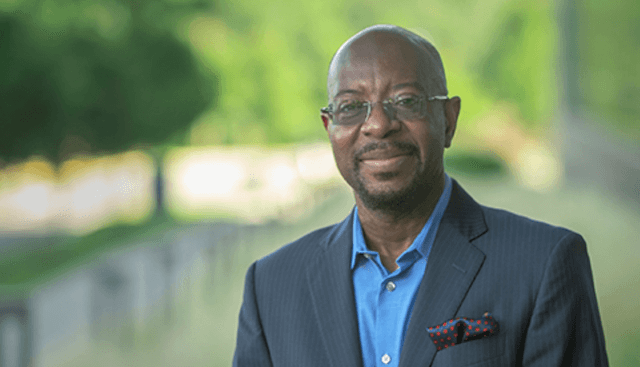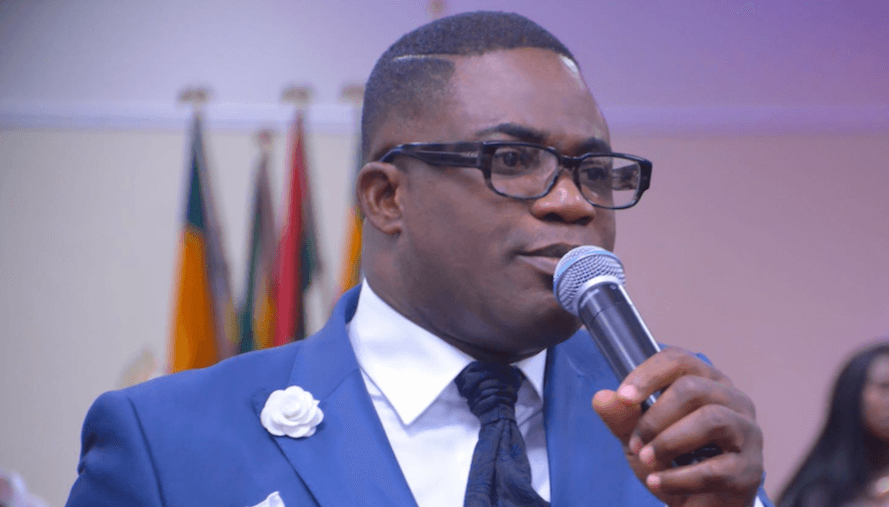
Tunde Sotunde MD is CEO and president of Durham-based Blue Cross and Blue Shield of North Carolina, the state’s largest insurer with more than 3.7 million members. A pediatrician by training, Sotunde held leadership roles as a physician, educator, and a health plan executive. Before assuming the top job at BCBSNC, Sotunde was president of Anthem’s Medicaid and related state government business across 23 states and Washington, D.C., with 7.3 million members and $33 billion in revenue.
In a virtual conversation as part of The Post’s C-Suite series, Sotunde, a native of Nigeria who attended boarding school in England, talked about his professional inspiration and development, cultural diversity, equity and in health care leadership. Answers are edited for length and clarity.
Q: What’s your background?
TS: I was born in Lagos, Nigeria, which is on the west coast of Africa, and I was the youngest of three siblings. I was born to parents who were both professionals. They had had the opportunity to be trained in the United Kingdom, and then came back to Nigeria to help develop the country. My dad was an engineer, and my mom was an administrator in the state-owned public utility company, so I think it’s fair to say that I grew up in a middle-class background, but it was still a third world country.
Q: Who or what your inspiration and aspiration growing up?
TS: Unfortunately, in the late ‘60s, when I was an infant, I was stricken by polio. It was at the height of the polio epidemic. I survived. I pulled through after several months, tough months, as my mom would tell the story, without any residual long lasting effects or impacts. And I grew up hearing my mother who’s 84 years old … the doctors told her there was nothing they could do. One day she took me home, she said, ‘I will never give up.’ She took me home and nursed me for months. She took a leave of absence and nursed me for about three months.
She had the doctor, Dr. Smith, I’ll never forget, come in to do house calls. And that was how I pulled through. So, from a very early age, I’ve been fascinated with the health sciences, the health arts, the art of healing. Also, I’ve always been aware, acutely aware of the fact that Wherever I am, wherever I was, at any point in time, it was because others did something for me. I’ve always wanted to do something back for others and that has shaped my life.
Q: Is that then the spark that caused you to pursue medicine? Or was it just something that was that was even more organic, that you just grew up? Thinking one of these days, I’m going to be a doctor?
TS: No, I never grew up thinking that I’ll be a doctor one of these days. It was just that experience. When you hear the story almost every week, it sticks with you. It just got me so interested in the healing arts and then I started to read about medicine and I started to think about it more I was kind of a rascally kid growing up, to be truth be told, so I wasn’t really that studious or paid attention to my studies as big as I should have. But I always knew in the back of my mind that there was a reason that I had survived that episode. Many people did not survive the polio epidemic, especially in third world countries – thousands did not survive. And even those that survived, ended up with long-lasting long-term effects or impacts. The fact that I was able to pull through, I just knew that this is something the good Lord has for me and health care just came naturally to me.
Q: When you talk about studying in the UK, obviously, you are an international traveler, because you’ve been to a lot of different places. How does that experience translate to the type of person that you are now?
TS: I think those experiences make me a very diverse person in the true sense of the word, right. You know, diversity, obviously, in terms of my race and ethnicity, diversity, in terms of my backgrounds, my experiences, the way I think about things, the way I approach things. Because in each of those countries, they’re very different. You have to adapt to the environment you find yourself in, so I’m one of those people that I feel comfortable in pretty much any environment. I can be in a room and be the only person of color and it doesn’t faze me at all.
I could be in a room [with] the top scientists and that doesn’t faze me. I could be in a room with our people, our communities and I just look at myself as a man of the people. The diversity of those experiences and having to adapt has really shaped the way I think about life, the way I approach life, and my leadership philosophy, which is always about servant leadership.
Q: You started as a pediatrician, but was always your goal?
TS: When I went into medicine, I always thought that I wanted to do obstetrics and gynecology. That’s what I wanted to do. But then I went to do my pediatric rotation. And it struck me that kids are so vulnerable, especially a younger age. They can’t tell you what’s going on. They can’t tell you what’s wrong, and when kids are sick, they look really sick. It is heartbreaking. And then, of course, the parents, they’re totally at a loss. That resulted in me changing course and studying pediatrics.
When I finished pediatrics, and Howard, then I now went up to upstate New York, to practice in a federally qualified community health center. … One of my first professional mentors … was a doctor by the name of Dr. Grinnell, [an] African American and a pediatrician. She has an MBA, master’s in business administration, she was the medical director of the community health center. I didn’t know doctors could do other things outside of treating patients. I went to her and said, ‘Hey, you know, I’m really interested in learning more about medicine, and care delivery.’ As she said, ‘Yeah, I’ll teach you.
Next thing, she made me chief of pediatrics for the community health center. Next thing, I went back, got an MBA. Next, I ended up on the health insurance side of the delivery system, because I wanted to figure out what do they do up there, providing care, what’s happening upstream. I love the practice of medicine. I missed practicing medicine every day, but I just knew from a health perspective, I could make more contributions in a system of care than I could in a clinic seeing one patient at a time.
Q: Do you consider yourself today to be a business leader and executive who has medical experience or are you a medical professional who just happens to be an executive?
TS: I will always be a medical professional, so I think of myself as a physician executive. I’m a doctor first and executive after the fact. So, would I be doing what I’m doing? Yes, they are transferable skills, but I’ll always be a doctor. There’s no question about that.”

Q: A lot of people now are talking about equity and making up for past misdeeds in certain industries and professions. As the leader of Blue Cross Blue Shield of North Carolina, how does your organization fit into that narrative in terms of making sure that there’s equity for everyone, especially for those groups that have been historically marginalized?
TS: We have to take a leading position. We’ve talked about health equity for many years and we talked about health disparities as health care providers, health care professionals, but what was different in the past 15 months, was when all of us saw how COVID was disproportionately impacting people of color minorities, people of diverse racial and ethnic backgrounds, underserved communities, and so on. They were getting it and dying from it at disproportionately higher rates than any other segment of the population. So, at Blue Cross, over 50% of our workforce today, are people of diverse racial and ethnic backgrounds. We made Forbes’ list many years as one of the leading employers for diversity, equity and inclusion. And of course, look at me as the CEO.
We said we have to do more. So, what did we do for the first time in our history? For the first time in our history, we issued a public statement where we said no community can be truly healthy until racism, discrimination, bias no longer exists. That was one, we then very quickly put together Diversity Council that I lead.
We set three priorities for us as an organization with respect to diversity, equity and inclusion. One is that our workforce will be fully representative at all levels of the organization, top to bottom left to right. With respect to our recruitment, or retention practices, and so on, so we’ve been doing a lot of work with HBCUs and other institutions, so that we can develop a pipeline. Two is health equity. We know that the social drivers, not medical drivers, transportation, food, you know, access to basic services, impacts one’s health and well-being access to mental health, basic primary care services.
We’re developing a health equity index to allow us to measure in a data driven manner. What are these disparities? What are these differences? race, ethnicity, gender, sexual orientation, geography, geography? We know the differences rural and urban? And then once we know exactly what they are, what are the drivers? And then what are the actions or interventions that we can take to address them.
Source: Herbert L. White / thecharlottepost
Oral Ofori is Founder and Publisher at www.TheAfricanDream.net, a digital storyteller and producer, and also an information and research consultant.




